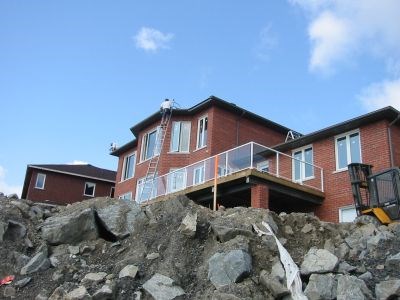Costs associated with building homes and apartments in Greater Sudbury are hurting the industry, city councillors were told June 21.
At a public meeting held as part of the city's decision to freeze development charges this year, Laura Higgs, of the Sudbury Home Builders Association, said construction in Sudbury has been declining since 2009, when the charges soared from about $3,000 per home to more than $14,000. Since then, commodity prices have slumped badly, along with home construction in the city.
Higgs said the market is so tough, there's a lack of younger developers entering the industry and there's a danger they could start sliding backwards.
“We work in a competitive industry that is heavily regulated, and getting more so,” she said, adding that builders are at the mercy of “decisions beyond our control.”
While they're used to the cyclical nature of the mining industry, she said more regulations, higher costs and fees, along with the mining slump is taking its toll on builders.
“You might say, death by 1,000 cuts,” Higgs said. “We encourage you to think beyond the one-year freeze.”
Naomi Grant, of the Coalition for a Liveable Sudbury, told councillors the freeze this year is an opportunity for the city to rethink the way it handles development charges.
The charges are fees developers must pay to build a new home, apartment building or commercial structure. Based on the principal that growth should pay for growth, builders are charged for the increased demands on city infrastructure (water, sewer, roads, etc.) that the new development will create.
For example, the city spent more than $60 million on a new biosolids plant, and estimate development charges could pay $4.8 million of that cost. The city plans to recover $2.9 million of the $5.7 million it spent building the South End Library, while it estimates the fees would cover $12.8 million of the $125.2 million Maley Drive extension.
Grant said that despite the charges, the city still spends more money on services for new homes than it gets back in tax revenue, citing $1.40 in new costs to $1 in new tax revenue as a common ratio for cities.
“So it's a net loss,” she said.
Grant said development charges could be used strategically, offering developers lower rates for building in certain areas that promote intensification, which offer a wider mix of housing and for building greener homes than have less of an impact on city services.
“That uses your land more efficiently,” she said.
And it's also great for residents, who will live in more compact communities and can walk or take transit to where they need to go.
She said the city should use the one-year freeze to study the different costs of building in different areas of the city, “so we know the true cost of development.
“Once you have that data, you can have area specific ratings,” Grant said.
At that point, they can offer developers a mix of incentives for building in areas that are the lowest cost to the city, while charging higher rates for people building in areas where costs will be higher.
Ward 10 Coun. Fern Cormier, who introduced the motion to freeze the charges this year, said they are already considering changes to the way development charges are handled.
“We will be looking at the opportunity to incorporate a lot of things you mentioned in your presentation,” Cormier said.
Ward 7 Coun. Mike Jakubo agreed, saying the goal is to direct building to the most sustainable areas.
“This one-year freeze gives us an opportunity to take the time to examine it in a little more depth and get it right,” Jakubo said.
The freeze means that about $380,000 in revenue being lost, but city staff said that's the amount forecast, but fees generated from building has been sluggish recently, meaning the actual figure is closer to $200,000.
This is the third year the charges have been frozen, meaning that increases that were supposed to be introduced gradually over five years will now be increased over just two years, unless councillors decide to change the system.




